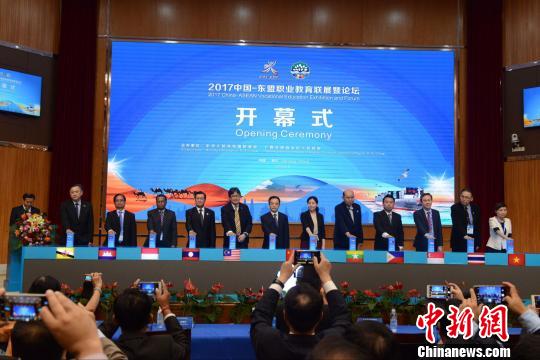Number of foreign students studying in Guangxi increases by 20 percent
In recent years, Guangxi Zhuang autonomous region has taken full advantage of its close ties with the ASEAN to increase international educational exchanges and cooperation.
In the past five years, the number of students studying in Guangxi has grown at an average annual rate of 20 percent, exceeding the national average. These students mainly come from ASEAN countries.
Guangxi universities have established cooperative relations with nearly 200 colleges and universities in neighboring countries, and 32 schools in the region have recruited foreign students. In the past five years, the number of students coming to Guangxi has grown to more than 57,000, including 42,000 from ASEAN countries.
About 14,000 international students from 118 different countries studied in Guangxi in 2017. Among them, 12,337 were from 65 countries along the Belt and Road and 9,465 were from ASEAN countries. Guangxi has one of the largest populations of international students from ASEAN countries of any province in China.
Since 2012, the Ministry of Education of Guangxi and the Guangxi government have jointly organized the China-ASEAN Vocational Education Exhibition and Forum four times. This event has been effective in promoting educational cooperation between Guangxi, ASEAN and neighboring countries.

The 2017 China-ASEAN Vocational Education Exhibition and Forum. [Photo/chinanew.com]
From 2014 to 2017, the Guangxi government invested in the construction, expansion and reconstruction of foreign student apartment buildings at 12 universities, including Guangxi University, to improve the study and living environment for international students.
Through the establishment of branch schools, training centers, and bases in ASEAN countries, Guangxi has also helped ASEAN countries develop their industries and vocational education.
In 2015, Shanghai General Motors Wuling (SGMW) started construction on an overseas production base in Jakarta, Indonesia. In order to ensure an ample supply of skilled workers, Liuzhou City Vocational College cooperated with SGMW to start training people in Indonesia.
In January 2016, the "Indonesia-China SGMW Automobile Education and Training Center" was established in Indonesia, and has since trained a large number of Indonesian professionals who are familiar with Chinese automobile production technology.
Guangxi has continuously improved its cooperation and exchange systems, and also promoted the establishment of the "ASEAN-China University Think-Tank Network" and "China-ASEAN Border Vocational Education League", which have helped form a multi-level, three-dimensional system integrating government, industry and schools.














